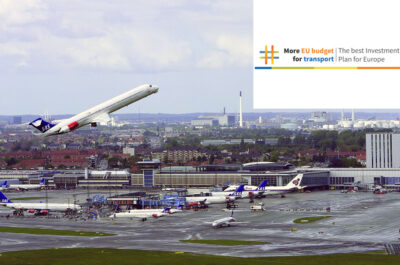
During his meeting with Marat Karabayev, Minister of Transport of Kazakhstan, the Director General of ACI EUROPE, Olivier Jankovec, pointed to the future of Kazakhstan as a fast-developing aviation market.
ASTANA – ACI Europe met with the Government of Kazakhstan, its Civil Aviation Committee and Aviation Administration (AAK) to address the challenges faced by the country in sustainably developing air connectivity to further support its economy.
During his meeting with Marat Karabayev, Minister of Transport of Kazakhstan, the Director General of ACI Europe, Olivier Jankovec, pointed to the future of Kazakhstan as a fast-developing aviation market. This is down to the size and geography of the country, the low propensity to fly of its population1 and a still largely untapped potential as a tourism destination – all of which indicate that demand for air transport is set to keep growing dynamically over the next 20 years. Crucially, new aviation development opportunities are also arising out of changed geopolitics, which have resulted in the Kazakh aviation market now being repositioned for air traffic flows across Eurasia – with the country’s airlines speeding up expansion plans.
But to unlock and realise this potential fully, Jankovec stressed the need to modernise and further develop airports: “Of course, this is about physically upgrading and modernising airports across the country through long-term planning, development and related financing. Crucially, this starts by allowing Kazakh airports to recover the cost of providing their facilities from users. The harsh limits currently placed upon Kazakh airports on what they can charge airlines is clearly an anomaly that needs to be urgently rectified. Not only are these limits at odds with international standards and practices, in particular from ICAO – but they also mean that airports are underfunded and have to disproportionately rely on ancillary activities. This is not sustainable, and risks holding up airport infrastructure development and service quality enhancements that will be essential for the success of the Kazakh aviation market.”
Other issues raised by ACI Europe included:
- The need to pursue an ‘Open Skies’ policy that fully liberalises market access, both domestic and international. In this regard, a closer integration of the Kazakh aviation market with the European Union and the wider European Common Aviation Area is an opportunity. Important steps have already been taken in this regard, including the negotiation underway of a so-called horizontal aviation agreement between Kazakhstan and the EU as foreseen by the EU-Kazakhstan Reinforced Partnership Agreement, as well as the on-going cooperation between Kazakhstan and EASA (European Union Aviation Safety Agency).
- Looking ahead, a comprehensive Aviation Agreement between Kazakhstan and the EU would open the way to even closer cooperation and market development. Such agreement should be seen as a strategic asset in reinforcing the positioning of Kazakh aviation across Eurasia traffic flows.
- The opportunity for Kazakhstan to actively participate and support ICAO in implementing its Long-Term Aspirational Goal (LTAG) for international aviation to achieve net zero CO2 emissions by 2050. The key enabling factor in this regard will be the development and deployment of Sustainable Aviation Fuels. Planning for that now and ensuring local production capabilities and uptake at competitive prices will be a key success factor for national aviation markets. We encourage Kazakhstan to set up its own strategy in this regard, in close cooperation with the aviation sector and relevant international organisations.
1 The propensity to fly (air trips per capita) stands at 0.52 for Kazakhstan compared to 1.53 for the EU and 1.25 for Turkey.
Tatiana is the news coordinator for TravelDailyNews Media Network (traveldailynews.gr, traveldailynews.com and traveldailynews.asia). Her role includes monitoring the hundreds of news sources of TravelDailyNews Media Network and skimming the most important according to our strategy.
She holds a Bachelor's degree in Communication & Mass Media from Panteion University of Political & Social Studies of Athens and she has been editor and editor-in-chief in various economic magazines and newspapers.























































































































































































